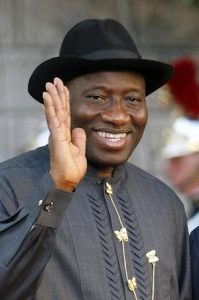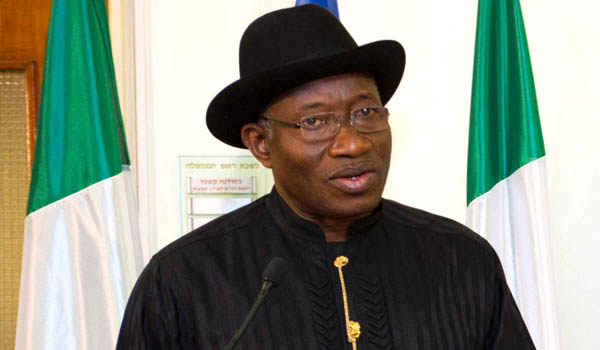Goodluck Jonathan is a Nigerian politician who served as the President of Nigeria from 2010 to 2015. He was born on November 20, 1957, in Otuoke, Bayelsa State, Nigeria. Goodluck Jonathan is a Nigerian politician who served as the President of Nigeria from 2010 to 2015. He was born on November 20, 1957, in Otuoke, a small village in Bayelsa State, Nigeria.
Jonathan’s political career began when he was appointed as the Deputy Governor of Bayelsa State in 1999. He later became the Governor of Bayelsa State in 2005, and in 2007 he was elected as the Vice President of Nigeria.
In 2010, Jonathan became the Acting President of Nigeria following the illness and subsequent death of President Umaru Yar’Adua. He was later elected as the President of Nigeria in 2011, serving until 2015.
During his presidency, Jonathan implemented several policies aimed at improving Nigeria’s economy, infrastructure, and education system. He also played a significant role in mediating political crises in other African countries.
After leaving office, Jonathan has remained active in politics and has been involved in several international diplomatic missions. His Excellency Dr. Goodluck Ebere Jonathan GCFR GCON May 5 2010 – 2015 may 29
PERSONAL DETAILS

Born: November 20, 1957
Political party: People’s Democratic Party (PDP)
Spouse: Patience Jonathan
Children: Two children – Ariwera Jonathan and Aruabai Jonathan
Education: Goodluck Jonathan holds a Bachelor of Science (B.Sc.) degree in Zoology, a Master of Science (M.Sc.) degree in Hydrobiology and Fisheries Biology, and a Doctor of Philosophy (PhD) degree in Zoology from the University of Port Harcourt, Nigeria.
Alma mater: University of Port Harcourt, Nigeria.
Official website: Goodluck Jonathan official website is Goodluck Jonathan official website
EARLY LIFE
Goodluck Jonathan was born on November 20, 1957, in Otuoke, a small village in Bayelsa State, Nigeria. He is the son of Lawrence Ebele Jonathan and Eunice Ayi Ebele Jonathan.
Jonathan attended St. Stephen Primary School, Otuoke, and Mater Dei High School, Imiringi, both in Bayelsa State, Nigeria. He later received his Bachelor of Science (B.Sc.) degree in Zoology in 1981, a Master of Science (M.Sc.) degree in Hydrobiology and Fisheries Biology in 1985, and a Doctor of Philosophy (PhD) degree in Zoology in 1995, all from the University of Port Harcourt, Nigeria.
Jonathan’s early career included working as an education inspector, lecturer, and environmental protection officer. He also served as the Assistant Director of the Rivers State Ministry of Agriculture and Natural Resources and as the Director of the Ecology and Pollution Control Department of the Oil Mineral Producing Areas Development Commission.
Jonathan’s entry into politics came in 1998 when he was appointed as the Deputy Governor of Bayelsa State.
EDUCATION
Goodluck Jonathan holds a Bachelor of Science (B.Sc.) degree in Zoology, a Master of Science (M.Sc.) degree in Hydrobiology and Fisheries Biology, and a Doctor of Philosophy (PhD) degree in Zoology from the University of Port Harcourt, Nigeria.
He began his academic journey at St. Stephen Primary School, Otuoke, and Mater Dei High School, Imiringi, both in Bayelsa State, Nigeria. After completing his secondary education, he gained admission into the University of Port Harcourt, where he obtained his first degree in Zoology in 1981.
In 1985, Jonathan obtained a Master’s degree in Hydrobiology and Fisheries Biology from the same university. He later went on to earn a Doctor of Philosophy (PhD) degree in Zoology from the University of Port Harcourt in 1995.
Jonathan’s educational background in science and biology played a significant role in his environmental protection work before he entered politics. His academic achievements also helped him to build a successful career in academia, as a lecturer at the Rivers State College of Education and later as an assistant professor at the University of Port Harcourt.
PRE-PRESIDENCY
Goodluck Jonathan’s political career began when he was appointed as the Deputy Governor of Bayelsa State in 1999. He later became the Governor of Bayelsa State in 2005, following the impeachment of his predecessor, Diepreye Alamieyeseigha.
As Governor of Bayelsa State, Jonathan implemented several policies aimed at improving the state’s economy, infrastructure, and education system. He also initiated several programs to improve the standard of living of the people in the state, including the Bayelsa Youth Leadership Scheme and the Bayelsa Women Empowerment Programme.
In 2007, Jonathan was elected as the Vice President of Nigeria, under the leadership of President Umaru Yar’Adua. During his tenure as Vice President, Jonathan played a crucial role in promoting peace and stability in the Niger Delta region, which had been plagued by years of violence and unrest.
Following the illness and subsequent death of President Umaru Yar’Adua in 2010, Jonathan was sworn in as the Acting President of Nigeria. He later contested and won the presidential election in 2011, becoming the first president from the Niger Delta region of Nigeria.
Before his presidency, Goodluck Jonathan served in various capacities in government, including as the Deputy Governor and later Governor of Bayelsa State, Vice President of Nigeria, and Acting President. He also played a significant role in promoting peace and stability in the Niger Delta region, which helped to improve the overall security situation in Nigeria.
VICE-PRESIDENT
Goodluck Jonathan was elected as the Vice President of Nigeria in 2007 under the leadership of President Umaru Yar’Adua. During his tenure as Vice President, he was responsible for several key portfolios, including the National Economic Council, Power Sector Reform Implementation Committee, and the Niger Delta Development Commission.
One of Jonathan’s primary focuses as Vice President was on promoting peace and stability in the Niger Delta region, which had been plagued by years of violence and unrest. He played a crucial role in negotiating a peace deal with militants in the region, which led to a significant reduction in violence and helped to stabilize the region.
Jonathan also spearheaded several initiatives aimed at improving Nigeria’s economy, including the establishment of the National Council on Micro, Small and Medium Enterprises, and the development of the Vision 20:2020 economic plan.
In addition to his duties as Vice President, Jonathan also served as the Chairman of the National Polio Eradication Committee and the Presidential Committee on the Niger Delta.
Overall, Jonathan’s tenure as Vice President was characterized by his efforts to promote peace, stability, and economic development in Nigeria. His role in negotiating a peace deal in the Niger Delta and his efforts to reform Nigeria’s power sector were particularly noteworthy.
GOODLUCK JONATHAN PRESIDENCY
Goodluck Jonathan was sworn in as the President of Nigeria on May 29, 2011, following his victory in the presidential election held earlier that year. His presidency was marked by several significant achievements, as well as several challenges.
One of Jonathan’s key achievements was in the area of electoral reform. His government established the Independent National Electoral Commission (INEC) and introduced biometric voter registration, which helped to improve the transparency and credibility of Nigeria’s elections.
Jonathan also implemented several policies aimed at promoting economic development, including the establishment of the YouWin! program, which provided funding and support for young entrepreneurs, and the National Industrial Revolution Plan, which aimed to promote local manufacturing and industrialization.
In the area of education, Jonathan’s administration launched several initiatives aimed at improving access to education, including the Almajiri Education Programme, which provided formal education to children in Northern Nigeria, and the establishment of several new universities and polytechnics.
However, Jonathan’s presidency was also marked by several challenges, including insecurity and corruption. His government faced significant criticism for its handling of the Boko Haram insurgency, which led to widespread violence and displacement in the Northeast region of Nigeria. Jonathan was also criticized for his government’s handling of corruption, with many accusing his administration of not doing enough to tackle the issue.
Despite these challenges, Goodluck Jonathan’s presidency was a significant moment in Nigeria’s political history, as he was the first president from the Niger Delta region of Nigeria.
His administration introduced several policies aimed at promoting development, and his government’s commitment to electoral reform helped to improve the credibility of Nigeria’s democratic process.
POST-PRESIDENCY
Following his presidency, Goodluck Jonathan has remained active in both Nigerian and international affairs.
Here are some of his post-presidency activities:
- 1. African Union and ECOWAS Mediation: Jonathan has been involved in several mediation efforts across Africa. He has been appointed as a special envoy by the African Union and the Economic Community of West African States (ECOWAS) to mediate in several conflicts, including in Mali, the Gambia, and Liberia.
- 2. International Elections Observation: Jonathan has been involved in international elections observation missions. He led the Commonwealth Observer Mission to Tanzania’s general elections in 2015, and the African Union Election Observation Mission to Zambia’s general elections in 2016.
- 3. Global Education Advocacy: Jonathan is an advocate for global education. He serves as the Chair of the African Progress Panel and the Chancellor of the Cavendish University in Uganda. He also founded the Goodluck Jonathan Foundation, which focuses on promoting education, democracy, and peace across Africa.
- 4. Author: Jonathan published his memoir, “My Transition Hours,” in 2018. The book details his experience in Nigerian politics, his presidency, and the challenges he faced while in office.
Overall, Goodluck Jonathan remains an influential figure in Nigerian and African politics.
His efforts in mediation and conflict resolution, his advocacy for education, and his continued involvement in international affairs have earned him recognition both in Nigeria and abroad.
PERSONAL LIFE
Goodluck Jonathan is a married man and has two children. He is married to Dame Patience Jonathan, who was Nigeria’s First Lady during his presidency. Patience Jonathan is also a prominent political figure in her own right and has been involved in several charitable initiatives, including the Women for Change and Development Initiative.
Goodluck Jonathan is known to be a deeply religious man and is a member of the Christian community in Nigeria. He is also known to be an avid reader and is said to have a personal library with a collection of over 10,000 books.
Jonathan is a keen sports enthusiast and enjoys playing and watching football. He is a supporter of the English Premier League football club, Arsenal.
Overall, Goodluck Jonathan is known to be a humble and down-to-earth person who values family and community.
HONOURS
Goodluck Jonathan has received several honours and awards both nationally and internationally. Here are some of them:
- 1. Order of the Niger (CON): Jonathan was awarded the Order of the Niger, which is one of the highest national honours in Nigeria, in 2011.
- 2. Grand Commander of the Order of the Republic of Sierra Leone (GCRSL): In 2013, Jonathan was awarded the GCRSL by the government of Sierra Leone for his contributions to peace and stability in the region.
- 3. African Leadership Award: Jonathan was awarded the African Leadership Award for Good Governance in 2013 by the United States Chamber of Commerce.
- 4. Presidential Medal of Honour: In 2014, Jonathan was awarded the Presidential Medal of Honour by the government of Namibia for his contributions to democracy and peace in Africa.
- 5. Martin Luther King Jr. Peace Award: In 2015, Jonathan was awarded the Martin Luther King Jr. Peace Award by the Southern Christian Leadership Conference in recognition of his efforts to promote peace and stability in Nigeria.
- 6. Sunhak Peace Prize: In 2021, Jonathan was awarded the Sunhak Peace Prize for his role in promoting democracy and human rights in Africa.
Overall, Goodluck Jonathan contributions to peace, stability, and democracy in Nigeria and Africa have earned him recognition both nationally and internationally.


